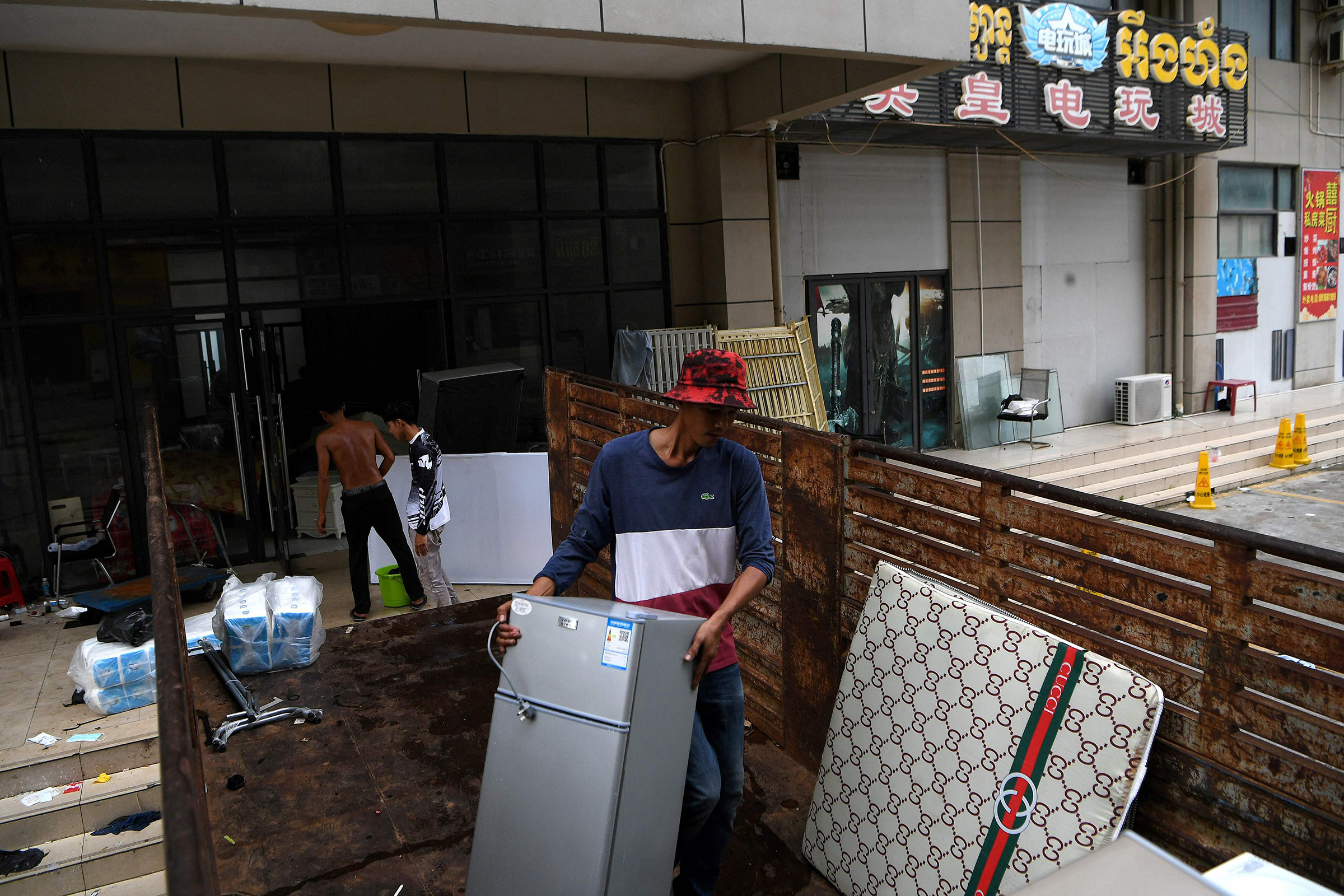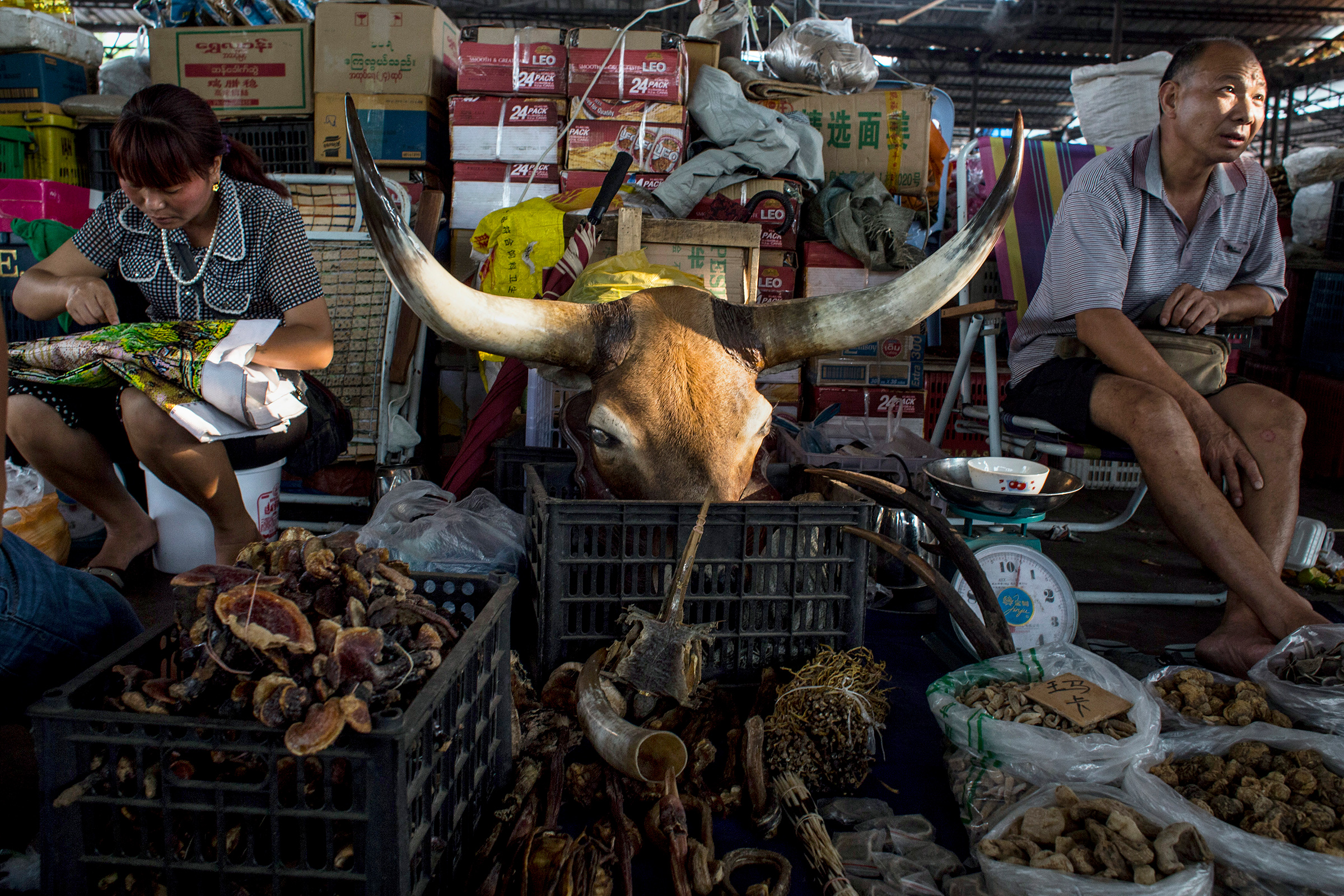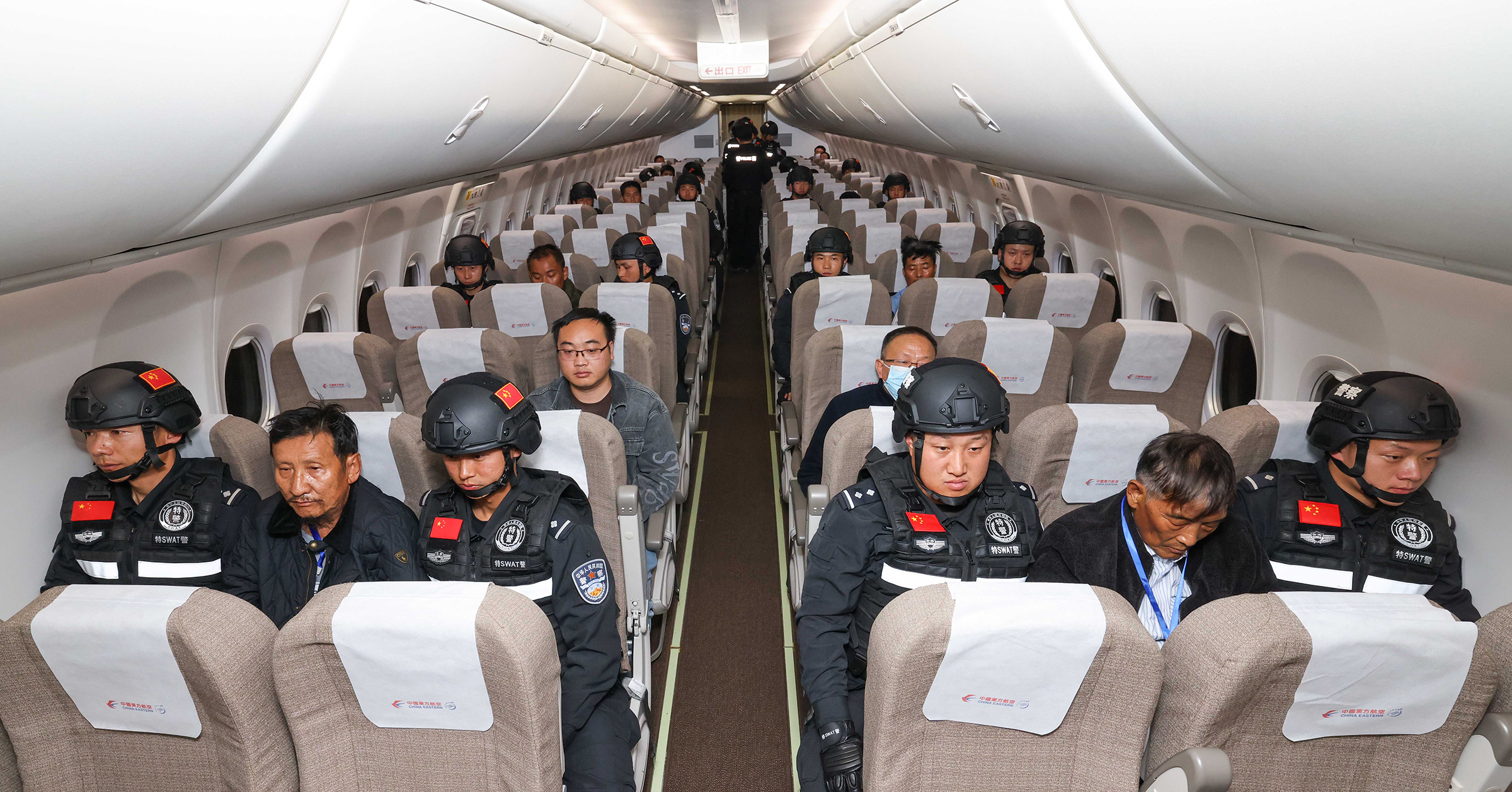It all started with a Facebook ad. Rachel Yoong was bored and fed up at work when a job posting for a casino in the Myanmar capital Yangon popped up on her phone. The purported $4,500 monthly salary was seven times what the Malaysian earned as a real estate agent in Kuala Lumpur, so she eagerly applied. Before long, Yoong was invited to two separate interviews with suave, well-attired agents. By July 2022, she was booked on a flight to Yangon and upon arrival told to rest up in a hotel. On the third day a car arrived to take her to her new place of work.
“But when I got inside there were two big, tough guys with guns,” Yoong, 30, tells TIME. “That’s the moment I knew I was in trouble.”
Instead of a casino in the city, Yoong says she was driven over 18 hours through 700 miles of winding mountain roads to Myanmar’s lawless northern region of Kokang by the border with China. There, she was sequestered in what was effectively a 10-story concrete prison inside state capital Laukkai with about 200 other human trafficking victims from China, Taiwan, Malaysia, and elsewhere across Asia. Sleeping eight to a cell, they were forced to conduct online scams for 17 hours each day, posing as attractive women using photos gleaned from social media to dupe predominantly American victims out of as much cash as possible. Those who didn’t meet their target of $1,000 every three days were subjected to beatings, electrocutions, and worse. “I saw three people die,” says Yoong. “One coworker jumped from the roof; two others were pushed.”
Yoong is one of hundreds of thousands of people across Southeast Asia and beyond who have been lured by fake job adverts into “pig-butchering” scam centers. (The term stems from fattening a hog for slaughter.) Whereas victims were originally drawn from Chinese-speaking communities in Malaysia, Thailand, or Singapore, today people are being trafficked to the region from as far afield as South America, East Africa, and Western Europe. Other than beatings, workers are subjected to sexual assault, rape, and having their organs forcibly harvested, according to Interpol. “What began as a regional crime threat has become a global human trafficking crisis,” said Interpol Secretary General Jürgen Stock.


Initially, scam centers were mainly run from Cambodia, but they have since shifted to Laos and northern Myanmar, marking a reboot for the fabled Golden Triangle as a global criminal hotspot. Back in the 1990s, 80% of all the heroin sold on the streets of New York originated from the triptych border straddling Myanmar, China, and Laos. But over the years, eradication programs in Laos and China combined with the U.S. War on Terror saw opium production shift to restive Afghanistan. Myanmar’s democratic transition under Nobel laureate Aung San Suu Kyi further curtailed the region’s role in drugs, with U.N.-backed crop substitution programs transforming crimson poppy fields into fruit orchards and tea plantations.
But since seizing power in a Feb. 1, 2021, coup d’etat, Myanmar’s military has waged a blood-soaked campaign to bring the country to heel, killing thousands and shattering the fragile peace in the Golden Triangle. There, ethnic rebel armies allied to the democratic resistance and junta-aligned militias both rely on taxing criminal gangs to fund their operations. While the return of the Taliban means opium production in Afghanistan has plummeted by 95%, poppy cultivation in Myanmar more than doubled in 2022 and continued to grow last year.
Other than heroin, this liminal land has also become the world’s top source of methamphetamine, with a June report by the United Nations Office on Drugs and Crime (UNODC) showing 151 tons seized in 2022 across the region, including 144 million meth pills in Laos alone—an 800% rise over the previous year. The combined heroin and meth trade in the Golden Triangle is estimated to be worth $60 billion, with local production capacity “practically infinite,” Jeremy Douglas, the UNODC’s Asia chief, told TIME in a January interview. With opium and heroin prices spiking owing to the ban in Afghanistan, “we’ll highly likely see Golden Triangle heroin showing up in markets it hasn’t been in for a long time, like the U.S. and Europe,” adds Douglas. “It’s almost like we’re starting to see a return to the heyday of the Golden Triangle.”

But as Yoong’s experience grimly shows, the Golden Triangle’s criminal reboot has metastasized beyond narcotics. Aided by modern telecoms and far from law enforcement, it is now the world’s unrivaled cybercrime hotspot, where armies of “dog-pushers”—as the lowly trafficked scammers are known—orchestrate romance-investment cons, crypto fraud, money laundering, and illegal gambling operations at some 1,000 scam prisons, generating $75 billion over the past four years, according to one study. In 2022, pig-butchering and other online cyber fraud cost Americans alone some $2.6 billion, according to the FBI, over double the previous year. Most was conducted from the Golden Triangle.
“It’s hideous, the scale is massive, we’ve never seen anything like this,” says Erin West, a Deputy District Attorney in Santa Clara County, Calif., who in 2022 established a nationwide taskforce to advise law enforcement on how to investigate online scams. “It only seems to be increasing and it’s billions and billions of dollars, household by household, being put in the hands of really horrible criminals.”
Thai Prime Minister Srettha Thavisin tells TIME that he’s had conversations with his counterparts in Laos and Cambodia who “agree that these problems need to be eradicated.” Meanwhile, a senior U.S. official in the region says the scam scourge is “something that has been discussed right up to the highest levels.” Yet much like the drugs trade, regional authorities have proven essentially powerless to tackle the scammers.
There are several drivers for the boom. Firstly, the pandemic curtailed the gangs’ traditional drugs smuggling routes and casino-based money laundering rackets, forcing them to diversify at a time when lockdowns meant people around the globe were spending more time than ever online. Furthermore, the rise of cryptocurrency provided a virtually untraceable way of collecting and sharing loot. And with Myanmar’s civil war continuing to rage and a global economic slowdown meaning no shortage of work-seekers desperate for a quick buck, the Golden Triangle criminal resurgence shows no sign of slowing.
“The international community has not paid adequate attention to Myanmar and the Triangle and this is the result,” says Douglas. “It’s unfortunate, and just shows what can happen when places slip off the priority list.”
The gang that snared Yoong set her to work conducting romance scams predominantly targeting men in Texas and Washington, D.C. Armed with a laptop and 20 cellphones, she concocted fake social media profiles to lure unsuspecting men into online relationships, then cajoled them to “invest” in supposedly lucrative schemes. Typically, scammers pose as working in import-export or the cosmetics or apparel business. Targets are people like Troy Gochenour, a semi-retired actor from Columbus, Ohio. He was wooed online by a woman named Penny, who claimed to live in Seattle. “I even bought a plane ticket to Seattle,” he recalls wearily. “Thank heavens I didn’t actually go.”

Every day, Penny would message with cute banalities: Good morning! Have a great day! Make sure you eat breakfast! Don’t work too hard! Message me later! But laced in between were carefully gauged questions about work and home life to assess how affluent the target is and how much could be gouged from them. “They ask you all these questions that two people getting to know each other would normally ask,” says Gochenour. “But the reason they’re doing it is to find out how much money you have.”
That so much of the “scamdemic,” as the UNODC has dubbed it, is orchestrated via social media, companies like Facebook parent Meta should be considered “enablers,” says West. “If they did a better job at keeping bad guys from their platform or reaching out to 100 people at a time to meet these victims then that would go a long way to solving this problem.” In a statement, a Meta spokesperson said: “We work with civil society, industry, and law enforcement to keep it off our platforms, while also running awareness campaigns to alert people of potential harm when searching for certain types of employment.”
After a couple of weeks of breezy flirtation, dog-pushers start talking about their rich uncle who’s a whizz at cryptocurrency and stumbled upon this amazing investment opportunity. These swindles are constantly evolving but the one that ensnared Gochenour is called the liquidity mining scam, in which a mark is told they can earn 1% interest per day for all the cryptocurrency in their digital wallet. Often, these returns are real at first to lure the victim into depositing more cash.
Gochenour was initially dubious, but the digital wallet Penny recommended was Coinbase—a publicly traded American company of repute—plus she offered to personally pay for the investment “voucher” that gained him access to the scheme. In truth, the voucher is a clandestine smart contract which permits a third party to transfer out an unlimited amount of funds from the wallet. Gochenour deposited $5,000 and it quickly disappeared. He contacted what he thought was Coinbase’s customer service. In fact, it was a fake chatbot run by the scammers and fraudulently adorned with the firm’s logo. In a statement, Coinbase said it strives to “track, report and block scam-related addresses, conduct blockchain analysis, and collaborate with law enforcement and exchanges to counteract fraud.”
Both Penny and the chatbot insisted that Gochenour’s money was safe but had been transferred to a collective investment pool. All he had to do was deposit another $5,000 to retrieve all his investment plus bonuses. Gochenour didn’t have $5,000, so he took out a loan. That money also disappeared. Again, Penny and the fraudulent customer service assured him that all was well and he just needed to deposit more money. Two more loans later and a total of $25,800 had been siphoned from his Coinbase wallet. Growing increasingly panicked, he then received a message saying that he had $200,000 waiting for him to collect but he first just needed to pay the $35,000 taxes owed on it. “It was at that point I realized that I was scammed,” he says.
Read More: What to Do if You’ve Been Scammed
In many ways, Gochenour got off lightly. He now volunteers for the Global Anti-Scam Organization, or GASO, a U.S.-based NGO that helps both scam and human-trafficking victims, and he has met several victims who have lost millions of dollars in a similar vein. The scale of the problem means that reputable digital wallets like Coinbase and Binance have begun assisting prosecutors like West to trace and occasionally retrieve swindled cash. But the digital tracing tools required are expensive, and once the crypto has been funneled through less legitimate exchanges it’s effectively gone. “It requires speed,” says West of her investigations. “And that’s a tricky thing because many victims are so humiliated that the last thing they want to do is report this terrible crime.”
This industrial-scale fraud is equally sophisticated and savage. TIME has reviewed dedicated scam channels on the Telegram messaging app that boast 170,000 members discussing techniques for duping different varieties of people—a self-help forum for transnational fraud. TIME also reviewed over a dozen scripts that bosses share online on how to train dog-pushers, such as contrasting techniques depending on social media platforms like Tinder, LinkedIn, and Instagram. Some suggest referencing European tourist sites like the Arc de Triomphe to conjure an impression of affluence. Others advise how to put off infatuated admirers when they request a video call.

But don’t be fooled by the cheery camaraderie. Scam bosses share much more than just pig-butchering CliffsNotes. Workers are sold between scam centers like human chattel. Chin Jian Hong quit his job selling snacks in East Malaysia’s province of Sabah after he saw a job advert for an air conditioning serviceman in West Malaysia on Facebook. But upon arrival in July 2022, Chin and his wife, Lim Jin Yew, were trafficked through Thailand to a casino complex by the Cambodian seaside resort town of Sihanoukville. With little technical knowledge and only rudimentary English, Chin says they constantly fell short of their targets and were mercilessly tortured with beatings and electrocution.
“The stun baton was not only electric; it also had two sharp blades on its end,” recalls Chin. “When it was used on us, it felt like we were being stabbed. They electrocuted us until our skin turned black and had a burnt smell.”
In total, Chin and Lim were sold to five different scam operations over four months in Cambodia. Each time they were traded, they would be ordered to shower and use make-up to cover their wounds to fetch a better price for the next scam boss, who would subsequently repeat the cycle of violence and abuse before they were patched up and sold again. “Towards the end, they were always hitting us,” recalls Chin. “It was bad. They hit me until I was weak and could barely walk. The moment I was going to die, the international police came.”
Read More: For Trafficking Victims Forced to Scam Others, the Nightmare Continues Even After Escape
For Yoong in Myanmar, being sold offered her best chance of escape. After her arrival in Laukkai, she at first resisted and was beaten twice, after which she diligently set about her new nefarious profession as the only way to save herself. She discovered she had a knack for the work and became one of the boss’s highest earners, clearing more than $30,000 every month. “One American customer in December 2022 ‘invested’ $200,000 with me,” she says.
Good workers were given a slice of their takings as well as other perks such as trips out to restaurants with the bosses as inducements. Yoong began charming her captors in the hope that she might wheedle enough freedom to eventually slip away. But she soon concluded it was impossible in Laukkai, where the local authorities were all in cahoots with the traffickers. It was also dangerous. One coworker was permitted to spend the night in a nearby hotel but while there was kidnapped by another gang, which demanded 500,000 rmb ($70,000) for his release. As he was a good worker, Yoong’s boss paid up. “Then the kidnapper called and asked him to collect the body,” says Yoong. “No matter if you pay, they’ll still kill you.”
After nine months in Kokang, Yoong persuaded her boss to sell her to another scam operation in the nearby entrepot of Mong La, from where a coworker had told her it would be easier to escape. Since Yoong was a top earner who spoke English, Mandarin, Cantonese, and Malay, her boss was reluctant to let her leave. In the end, she paid 300,000 rmb ($40,000) to be sold to a rival gang in Mong La, a notorious trafficking hotspot perched on the border with China.

At her new scam center in Mong La, Yoong was placed in charge of running a team of dog-pushers. But in September, the Chinese police raided the complex and arrested everyone. All the Chinese nationals were returned to China and Yoong begged them to help her too. “But because I’m Malaysian,” she says, “they did nothing.”
A stunning aspect of Southeast Asia’s scamdemic is how so much happens in plain sight, abetted by venal local officials. Since the dog-pushers are constantly online and chatting with hundreds of targets, it’s relatively easy for them to contact family, law enforcement, embassy staff, and NGOs like GASO to seek help. It matters little. The Cambodian police had visited the complexes where Chin and Lim were held but “were useless,” says Chin. “They would come in for a short while and leave.”
Three of the most prominent investors in Cambodia’s scam industries are Dong Lecheng, She Zhijiang, and Xu Aimin, who have all been convicted in China of financial crimes totalling tens of millions of dollars. Dong’s company, Golden Sun Sky Entertainment, developed an area in Sihanoukville dubbed “Chinatown” that became a notorious hub of scam prisons. In December, as part of a coordinated sanctions campaign alongside the U.S. and Canadian governments, the U.K. sanctioned both Dong and She for their involvement in scam rackets, while Sihanoukville’s K.B. Hotel, owned by Xu, was also listed. All three have high-level government connections.
She is also believed to be the brains behind Myanmar’s most notorious scam center, KK Park, a knot of beige concrete blocks perched on Moei River that separates the nation’s Myawaddy region from Thailand. She was arrested in Thailand in August 2022 and is currently fighting extradition to China. Nevertheless, satellite photos show KK Park continues to rapidly expand as the scamdemic grows.


Another scam kingpin is believed to be Chinese gangster Zhao Wei, who was also named on December’s U.K. sanctions and was previously sanctioned in 2018 by the U.S. Treasury Department for his alleged involvement in money laundering and narcotics. Zhao cut his teeth in the Macao casino business before trying his luck in Mong La. In 2007, Zhao established the Golden Triangle Economic Zone, which occupies a parcel of Laos across the Mekong River from the Thai town of Chiang Saen. Every day, gamblers make the unofficial journey on longtail boats to try their luck at Mahjong tables in the zone’s Kings Roman Casino complex. Looming over its neon-clad facade are menacing tower blocks with iron bars on the windows where dog-pushers are put to work. While the Thai government has repeatedly vowed to crack down on the scam centers, both KK Park and Kings Roman remain plugged into the Thai electricity grid and utilize their telecoms networks.
The only authority with any real clout is that in Beijing, given China’s role as regional superpower and the fact that its nationals are both victims and perpetrators. Pig-butchering scams are almost without exception run by triad gangs who set up on China’s periphery, where the transnational nature of the crime, fuzzy jurisdiction and venal local authorities make cases difficult to prosecute. “All the bosses were from China,” says Yoong.
At first, the principal targets were affluent communities in China, Taiwan, and Singapore. Before long, the scamdemic became so prevalent that a 2023 film about pig butchering, No More Bets, broke box office records in China. Citizens began to ask why the supposedly omnipotent Chinese Communist Party was powerless against ragtag hoodlums in the poorest fringes of Asia’s poorest nations. Chinese security officials started putting pressure on local authorities to rein in the scammers.
In recent months, China has begun strong-arming both the Myanmar government and rebel groups that abet the gangs into cracking down on scam centers. (Kokang rebels have long ethnic and historic ties to China, which owing to their secluded perch provides nearly all supplies, including weaponry.) On Nov. 21, Myanmar handed over 31,000 captured scam suspects back to China. In January, three of the four biggest crime bosses in Kokang—Bai Suocheng, Wei Chaoren and Liu Zhengxiang—were forcibly repatriated to China. In an ironic twist, some of the rebel groups most notorious for narcotics production and smuggling are today taking credit for pushing out the scammers. “It’s been good PR for them,” says Douglas of the UNODC. But Beijing’s intent is merely to protect its own citizens, meaning the gangs are shifting their focus towards the corpulent West instead.

After the raid in Mong La, Yoong’s detained Chinese coworkers were repatriated. However, Yoong and the other nationalities were simply locked up for two weeks in a local police station. When they were finally released, their captors were waiting outside to collect them. It was too dangerous to immediately restart operations, however, and so the scam bosses buried their computers and cellphones in mud pits and corralled everyone deep into the surrounding jungle. Yoong and about 100 other dog-pushers were confined in a ramshackle complex of stilted, timber shacks with thatch roofs, which became their home for a month, subsisting on two daily meals of rice and vegetables while being feasted upon by mosquitos and assorted beasties.
Then Yoong had a heart attack. “It was only a mild one,” she laughs. Still, she played up her condition to persuade her jailers that she needed urgent medical treatment. When they took her back to Mong La to see a doctor, she carefully noted the route they traveled for possible future escape. Back in the squalid camp, Yoong stealthily canvased her coworkers and discovered about 60 were willing to risk a hasty getaway. Given there were only about 20 guards, who were merely armed with wooden batons instead of guns as before, numbers were on their side. Yoong shared her intel on the best route out. One day, at a pre-allotted time, Yoong and her conspirators all started shouting “Police are here! Run! Run!” and made a break for it.
But in her weakened condition, Yoong was among the slowest and quickly recaptured. With around 50 workers having fled, the furious bosses demanded to know who the ringleader was. Well aware that Yoong was in no condition to survive their savage reprisals, a Chinese coworker from Sichuan province took the blame instead. “My friend got very badly beaten for a week because the company made a huge loss,” says Yoong. “For about one month he couldn’t get off his bed. I’m very thankful; he’s a very brave person.”
Fearful that the escapees would reveal the gang’s hideout, they began changing locations frequently. At one camp, Yoong managed to befriend a Mong La local who was employed to cart away rubbish and persuaded her to help. Eventually, she came back with the police, who arrested everyone. Yoong contacted the Malaysian Embassy in Yangon but they said they were unable to offer assistance.
After she was released from the police station, Yoong knew her former bosses were aware she had orchestrated the raid and would be looking for revenge. So she called up some former coworkers that had been trafficked to Laos and offered to work for them instead. The gang spirited her across the border into the Golden Triangle Economic Zone, where she was put to work in her third scam center. However, security was lax and Yoong was able to contact the Malaysian Embassy in the capital Vientiane. After eight days she was rescued and, after waiting for a month for various paperwork, returned to Kuala Lumpur in January. “I still can’t believe I’m alive and back in my own country.”
Yoong’s hell may be over, but for many escapees it’s not so simple. Lawlessness in the Golden Triangle may incubate the scamdemic, but poverty is what drives so many thousands into the gangs’ clutches. Over the past couple of years, GASO has helped some 500 people escape from scam prisons, but also has a growing blacklist of people who’ve been duped a second or third time and, given limited resources, are sadly deemed low priority for further assistance. “A lot of times they go home, it’s still the same bad situation, so what do you do?” says Leslie G, the head of GASO’s Human Trafficking Division, who requested TIME not use her full name for security concerns. “The lure of the money is still there, so they end up going back.”
Yoong, for one, has no such desire. Her message is clear: “No matter if your friend or your relative or the internet tells you about a high salary job overseas, don’t believe it,” she says. “You never know if you’ll get out alive.”
—With reporting by Koh Ewe/Singapore.
More Must-Reads from TIME
- Donald Trump Is TIME's 2024 Person of the Year
- Why We Chose Trump as Person of the Year
- Is Intermittent Fasting Good or Bad for You?
- The 100 Must-Read Books of 2024
- The 20 Best Christmas TV Episodes
- Column: If Optimism Feels Ridiculous Now, Try Hope
- The Future of Climate Action Is Trade Policy
- Merle Bombardieri Is Helping People Make the Baby Decision
Write to Charlie Campbell / Chiang Mai, Thailand at charlie.campbell@time.com
